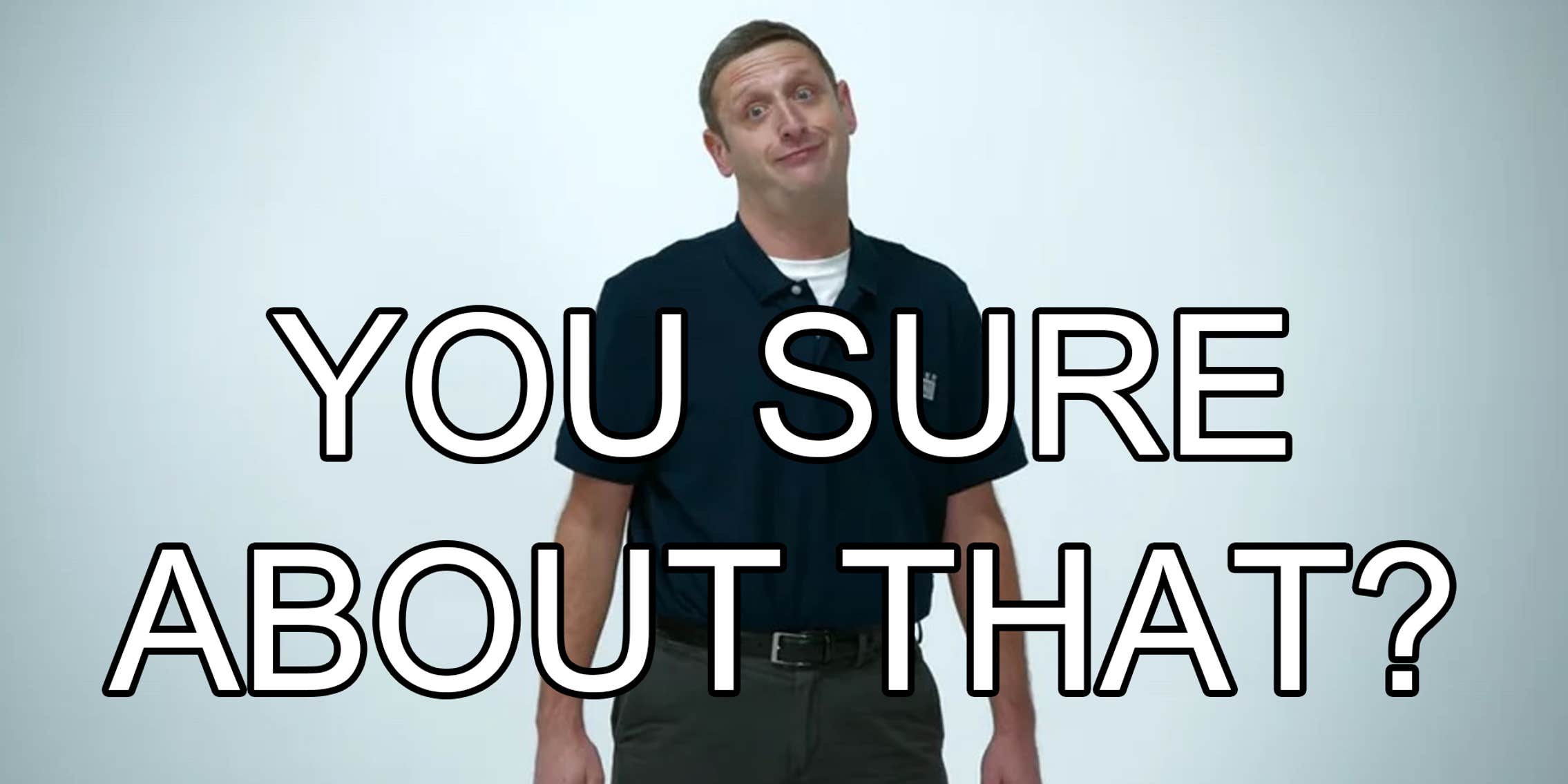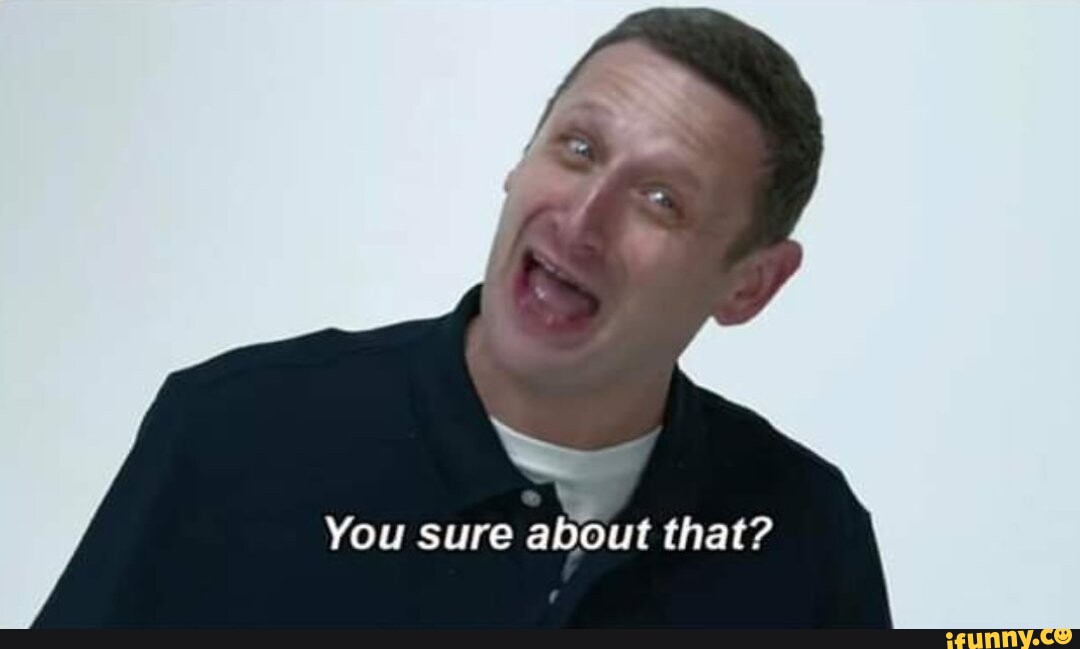Have you ever found yourself in a situation where someone says something, and you just can't help but think, "You sure about that?" It's one of those phrases that carries so much weight yet feels so casual. Whether it's a friend making an outrageous claim or a colleague presenting a questionable statistic, this simple question has the power to stop conversations in their tracks. But why does it have such an impact? Let's explore what happens when we dare to question assumptions and how it shapes our understanding of the world.
We live in a world where information is abundant, but not all of it is reliable. In fact, studies show that people tend to accept information at face value without verifying its accuracy. This tendency can lead to misunderstandings, poor decisions, and even conflict. So, next time someone throws out a bold statement, don't hesitate to ask, "You sure about that?" It might just save you from falling into a trap of misinformation.
Throughout this article, we'll dive deep into why questioning assumptions matters, how to do it effectively, and the benefits of fostering a culture of curiosity. Whether you're a student, professional, or just someone who enjoys healthy debates, this guide will equip you with the tools you need to challenge conventional wisdom and uncover the truth. So, buckle up and let's get started!
Read also:Xnnn
Here's a quick overview of what we'll cover:
- Introduction
- Why You Should Question Assumptions
- Common Mistakes When Questioning
- How to Question Effectively
- The Psychology Behind Doubt
- Real-Life Examples
- Benefits of Questioning
- Tips for Building Critical Thinking
- The Role of Misinformation
- Conclusion
Why You Should Question Assumptions
Assumptions are like shortcuts for our brains. They help us make sense of the world quickly, but they can also lead us astray. When we assume something is true without evidence, we risk making poor decisions that could have been avoided with a little more scrutiny. For instance, think about how many times you've heard someone say, "Everyone knows that," only to find out later that the claim wasn't entirely accurate.
Questioning assumptions forces us to think critically and examine the facts. It encourages us to seek out evidence and consider alternative perspectives, which ultimately leads to better decision-making. Moreover, it fosters a culture of openness and curiosity, where people feel empowered to challenge the status quo and explore new ideas. So, the next time someone makes a bold claim, don't be afraid to ask, "You sure about that?"
Breaking Down the Importance
Let's break it down further:
- It promotes critical thinking.
- It prevents the spread of misinformation.
- It encourages creativity and innovation.
- It strengthens relationships by fostering open communication.
In today's fast-paced world, where information is constantly evolving, questioning assumptions has never been more important. By doing so, we ensure that we're making informed decisions based on facts rather than assumptions.
Common Mistakes When Questioning
While questioning assumptions is essential, it's important to do it the right way. Otherwise, you might come across as confrontational or dismissive, which can damage relationships and hinder productive conversations. Here are some common mistakes people make when questioning others:
Read also:Camilla Araujo
- Being overly aggressive or dismissive.
- Not listening to the other person's perspective.
- Using emotionally charged language instead of facts.
- Failing to provide evidence to support your counterarguments.
For example, imagine you're in a meeting, and someone presents a plan based on an assumption. Instead of saying, "That's ridiculous," you could say, "I'm curious about the data behind that. Can you share more details?" This approach is respectful and encourages further discussion without shutting down the conversation.
How to Avoid These Mistakes
Here are a few tips to help you avoid common pitfalls:
- Stay calm and composed during discussions.
- Focus on facts and evidence rather than personal opinions.
- Use open-ended questions to encourage dialogue.
- Be willing to admit when you're wrong.
By approaching conversations with a mindset of curiosity and respect, you can create an environment where questioning assumptions is seen as a positive and productive activity.
How to Question Effectively
Now that we've discussed why questioning assumptions matters and how to avoid common mistakes, let's talk about how to do it effectively. Effective questioning involves a combination of critical thinking, communication skills, and emotional intelligence. Here's a step-by-step guide:
Step 1: Listen Carefully
Before you jump in with questions, take a moment to listen to what the other person is saying. Pay attention to their tone, body language, and choice of words. This will help you understand their perspective and identify any gaps in their reasoning.
Step 2: Ask Open-Ended Questions
Open-ended questions are a powerful tool for encouraging deeper discussions. Instead of asking yes-or-no questions, try asking questions that require more thought and explanation. For example, instead of saying, "Is that true?" you could say, "What evidence supports that claim?"
Step 3: Provide Evidence
If you're challenging someone's assumption, it's important to back up your argument with evidence. This shows that you've done your research and are approaching the conversation with an open mind. For instance, if someone claims that a certain product is the best on the market, you could respond by saying, "I've seen some studies that suggest otherwise. Can we take a closer look at the data?"
The Psychology Behind Doubt
Why do people resist questioning assumptions? The answer lies in psychology. Humans are naturally inclined to seek certainty and avoid uncertainty. This tendency is rooted in our evolutionary past, where quick decisions were often a matter of life and death. However, in today's world, this instinct can sometimes work against us, leading us to accept information without scrutiny.
Studies show that people are more likely to believe information that confirms their existing beliefs, a phenomenon known as confirmation bias. This bias can make it difficult to question assumptions, especially when they align with our worldview. However, by recognizing this bias and actively seeking out diverse perspectives, we can overcome it and make more informed decisions.
Overcoming Confirmation Bias
Here are a few strategies to help you overcome confirmation bias:
- Seek out information from multiple sources.
- Engage with people who have different perspectives.
- Practice active listening and empathy.
- Be open to changing your mind when presented with new evidence.
By embracing uncertainty and seeking out diverse perspectives, you can become a more effective critical thinker and decision-maker.
Real-Life Examples
Let's take a look at some real-life examples of how questioning assumptions has led to groundbreaking discoveries and innovations:
Example 1: The Flat Earth Theory
For centuries, people believed that the Earth was flat. It wasn't until explorers like Christopher Columbus and Ferdinand Magellan set sail and proved otherwise that this assumption was challenged. Their willingness to question the prevailing wisdom paved the way for new discoveries and advancements in science and technology.
Example 2: The Heliocentric Model
Another famous example is the heliocentric model of the solar system. For thousands of years, people believed that the Earth was the center of the universe. It wasn't until astronomers like Copernicus and Galileo questioned this assumption that the true nature of our solar system was revealed.
These examples illustrate the power of questioning assumptions and how it can lead to transformative breakthroughs. By daring to ask, "You sure about that?" we open ourselves up to new possibilities and discoveries.
Benefits of Questioning
So, what are the benefits of questioning assumptions? Here are a few:
- Improved decision-making.
- Increased creativity and innovation.
- Stronger relationships built on trust and openness.
- Reduced risk of misinformation and misunderstanding.
By fostering a culture of curiosity and critical thinking, we create an environment where people feel empowered to challenge the status quo and explore new ideas. This leads to better outcomes and a more informed society.
Tips for Building Critical Thinking
Here are some practical tips for building your critical thinking skills:
- Read widely and diversely to expose yourself to different perspectives.
- Practice active listening and empathy in conversations.
- Engage in debates and discussions with people who have different viewpoints.
- Stay curious and open-minded, always seeking out new information and evidence.
By incorporating these practices into your daily routine, you'll become a more effective critical thinker and decision-maker.
The Role of Misinformation
Misinformation is a growing problem in today's world, fueled by social media and the rapid spread of information. When we fail to question assumptions, we risk falling victim to misinformation, which can have serious consequences. For example, during the COVID-19 pandemic, misinformation about vaccines led to widespread confusion and resistance, hindering efforts to control the spread of the virus.
By questioning assumptions and seeking out reliable sources of information, we can protect ourselves and others from the dangers of misinformation. It's important to remember that not all information is created equal, and it's up to us to critically evaluate the sources we rely on.
Conclusion
In conclusion, questioning assumptions is a vital skill that can lead to better decision-making, improved relationships, and a more informed society. By approaching conversations with curiosity and respect, we can create an environment where people feel empowered to challenge conventional wisdom and explore new ideas. So, the next time someone makes a bold claim, don't hesitate to ask, "You sure about that?"
We encourage you to share your thoughts and experiences in the comments below. How do you approach questioning assumptions in your daily life? What strategies have worked for you? By sharing your insights, you can help others develop their critical thinking skills and contribute to a more informed and engaged community.


